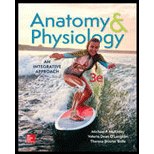
Concept explainers
Introduction:
Blood is a connective tissue which flows from the heart through arteries and veins to all body parts. Whole blood consists of two elements- formed elements and plasma. The total volume of formed elements in the blood which are erythrocyte, platelets, and leukocytes is called as hematocrit. But clinically the total percentage of erythrocytes in blood is known as hematocrit.
Answer to Problem 1DYB
Correct answer:
The value of hematocrit varies according to sex and age of individuals. The hematocrit of very young children may vary from
Explanation of Solution
Reason for the correct statement:
Option b. is given as “a dehydrated adult male”. The percentage of hematocrit is affected by dehydration condition. If a person has a high hematocrit range it means the person is either suffering from dehydration or is involved in blood doping. As the value of hematocrit is already higher than children and females, its value will increase more in dehydration condition. Thus, the hematocrit value of a dehydrated male will be maximum. Hence; the hematocrit value would be highest in a dehydrated male.
Hence, option b. is correct.
Reasons for the incorrect statements:
Option a. is given as “a 10-year old child”. The hematocrit of very young children may vary from
Option c. is given as “a healthy, nonmenstruating female”. In adult females, the hematocrit value ranges between
Option d. is given as “a healthy, menstruating adult female”. In adult females, the hematocrit value ranges between
Hence, options a., c., and d. are incorrect.
The hematocrit range value would be highest in a ten-year-old boy than a dehydrated male and a healthy female.
Want to see more full solutions like this?
Chapter 18 Solutions
Anatomy & Physiology
- Describe the principle of homeostasis.arrow_forwardExplain how the hormones of the glands listed below travel around the body to target organs and tissues : Pituitary gland Hypothalamus Thyroid Parathyroid Adrenal Pineal Pancreas(islets of langerhans) Gonads (testes and ovaries) Placentaarrow_forwardWhat are the functions of the hormones produced in the glands listed below: Pituitary gland Hypothalamus Thyroid Parathyroid Adrenal Pineal Pancreas(islets of langerhans) Gonads (testes and ovaries) Placentaarrow_forward
- Describe the hormones produced in the glands listed below: Pituitary gland Hypothalamus Thyroid Parathyroid Adrenal Pineal Pancreas(islets of langerhans) Gonads (testes and ovaries) Placentaarrow_forwardPlease help me calculate drug dosage from the following information: Patient weight: 35 pounds, so 15.9 kilograms (got this by dividing 35 pounds by 2.2 kilograms) Drug dose: 0.05mg/kg Drug concentration: 2mg/mLarrow_forwardA 25-year-old woman presents to the emergency department with a 2-day history of fever, chills, severe headache, and confusion. She recently returned from a trip to sub-Saharan Africa, where she did not take malaria prophylaxis. On examination, she is febrile (39.8°C/103.6°F) and hypotensive. Laboratory studies reveal hemoglobin of 8.0 g/dL, platelet count of 50,000/μL, and evidence of hemoglobinuria. A peripheral blood smear shows ring forms and banana-shaped gametocytes. Which of the following Plasmodium species is most likely responsible for her severe symptoms? A. Plasmodium vivax B. Plasmodium ovale C. Plasmodium malariae D. Plasmodium falciparumarrow_forward
- please fill in missing parts , thank youarrow_forwardplease draw in the answers, thank youarrow_forwarda. On this first grid, assume that the DNA and RNA templates are read left to right. DNA DNA mRNA codon tRNA anticodon polypeptide _strand strand C с A T G A U G C A TRP b. Now do this AGAIN assuming that the DNA and RNA templates are read right to left. DNA DNA strand strand C mRNA codon tRNA anticodon polypeptide 0 A T G A U G с A TRParrow_forward
 Medical Terminology for Health Professions, Spira...Health & NutritionISBN:9781305634350Author:Ann Ehrlich, Carol L. Schroeder, Laura Ehrlich, Katrina A. SchroederPublisher:Cengage LearningEssentials of Pharmacology for Health ProfessionsNursingISBN:9781305441620Author:WOODROWPublisher:Cengage
Medical Terminology for Health Professions, Spira...Health & NutritionISBN:9781305634350Author:Ann Ehrlich, Carol L. Schroeder, Laura Ehrlich, Katrina A. SchroederPublisher:Cengage LearningEssentials of Pharmacology for Health ProfessionsNursingISBN:9781305441620Author:WOODROWPublisher:Cengage





